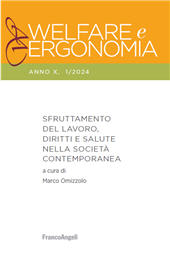The relevance of multi-level governance on contrasting the social inequity health determinants of exploited migrant workers: A comparison between the Project P.I.U. Su.Pr.Eme. in the Region of Sicily and the Project Common Ground in the Veneto Region
115-136 p.
In Italy, migrants are often exposed to labour exploitation by working without a contract, adequate protection equipment, or being underpaid. Precarious labour conditions of migrant workers frequently hinder their regular access to essential services, such as housing. Consequently, there is a lack of endowment to social protection and health assistance. In the last decade, Italy's high number of migrant victims of labour exploitation led the government to implement national policies and actions that subsequently contrast this phenomenon and the informal economy. However, different regional governances were established: while the multilevel governance was mainly implemented through the project Common Ground in the Northern Regions, the Southern regions enacted the project P.I.U. Su.Pr.Eme. Applying the Conceptual Framework for Action on the Social Determinants of Health, this study, through a mixed method research conducted with the P.I.U. Su.Pr.Eme. and Common Ground street-level bureaucrats.
in Veneto and Sicily aim to 1) analyse the role of multilevel governance on the facilitation of health endowment of migrants working within an exploitative situation; 2) understand the recognition of the institutional representation through the private sector implementing P.I.U. Su.Pr.Eme. and Common Ground within multilevel governance; 3) assess the influence of gender and nationality as structural determinants that are perceived to impact the health inequity of migrant workers in the Veneto and Sicily regions. [Publisher's Text].
Spesso vittime di sfruttamento lavorativo, sottopagati e privi di un contratto di lavoro o adeguati dispositivi di protezione, i migranti in Italia detengono preca-rie condizioni di lavoro, che spesso ostacolano il regolare accesso ai servizi es-senziali, come l'alloggio, la protezione sociale e l'accesso alle cure. Nell'ultimo decennio, l'elevato numero di migranti vittime di sfruttamento lavorativo in Italia ha indotto il governo ad attuare politiche e azioni nazionali di contrasto a que-sto fenomeno e all'economia informale. Tuttavia, sono state istituite diverse governance regionali: mentre la governance multilivello è stata attuata principal-mente attraverso il progetto Common Ground nelle regioni del Nord, le regioni del Sud hanno attuato il progetto P.I.U. Su.Pr.Eme .
Questo studio, basato sull'applicazione dell'azione dei determinanti sociali della salute, attraverso la mixed method research condotta con gli street level bureaucrats di P.I.U. Su.Pr.Eme. e Common Ground in Veneto e Sicilia, mira a 1) analizzare il ruolo della governance multilivello nella facilitazione dell'accesso alla salute (endowment) dei migranti che lavorano in una situazione di sfrutta-mento; 2) comprendere il riconoscimento della rappresentanza istituzionale at-traverso il settore privato che implementa P.I.U. Su. Pr.Eme. e Common Ground all'interno della governance multilivello; 3) valutare l'influenza del genere e del-la nazionalità come determinanti strutturali che hanno un impatto sull'iniquità della salute dei lavoratori migranti nelle regioni Veneto e Sicilia. [Testo dell'editore].
Is part of
Welfare e ergonomia : X, 1, 2024-
Articles from the same issue (available individually)
-
Information
ISSN: 2531-9817
KEYWORDS
- sfruttamento lavorativo, governance multilivello, determinanti sociali della salute, migrazione, governance regionale, organizzazioni della società civile, street level bureaucrats
- labour exploitation, multilevel governance, social determinants of health, migration, regional governance, civil society organisations, street-level bureaucrats


